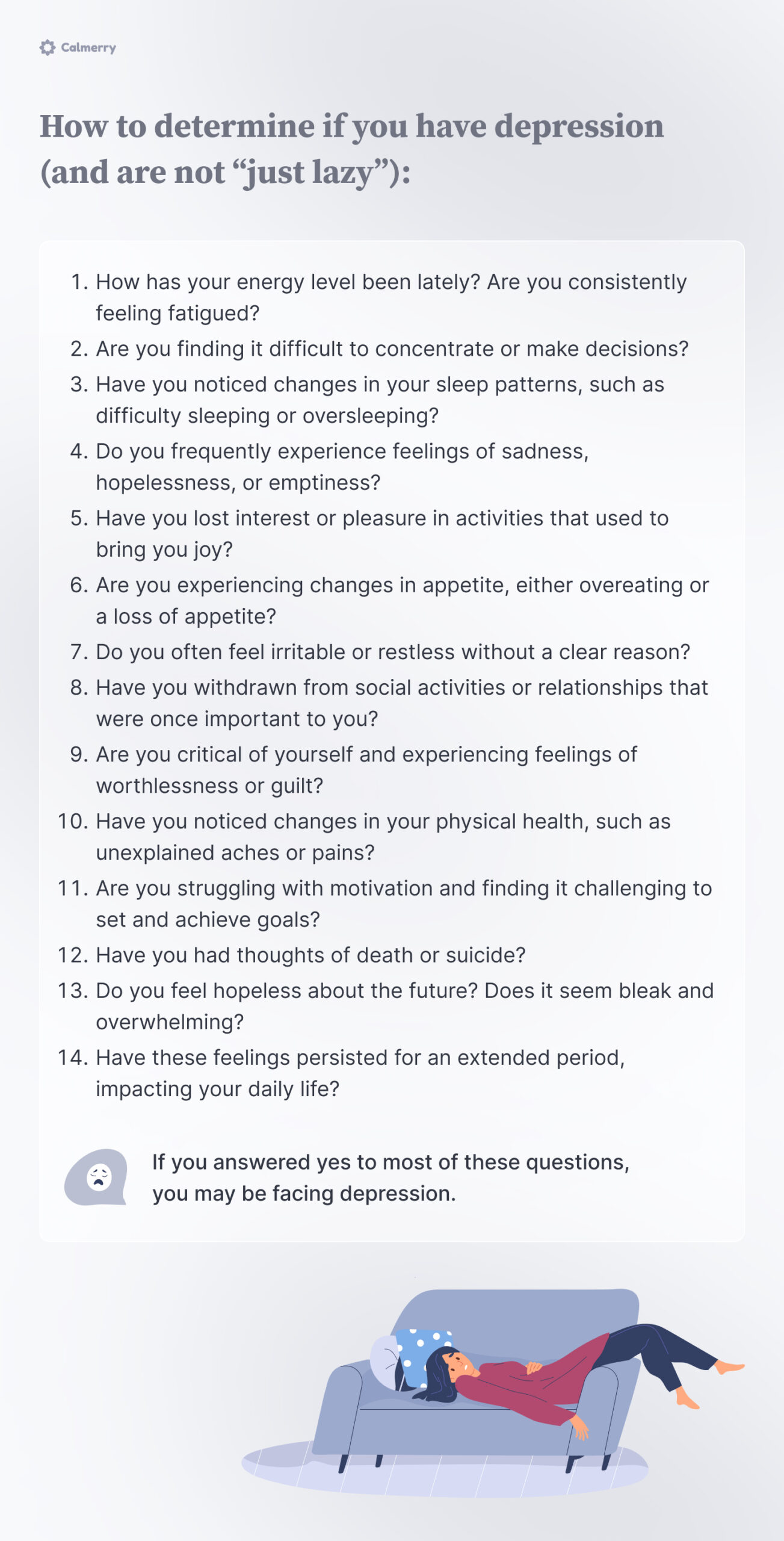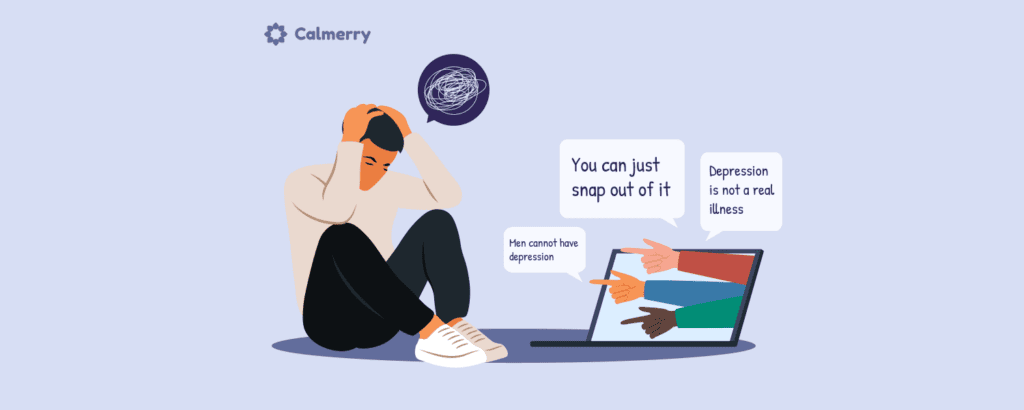Am I Depressed or Just Lazy?

In this article
We’ve all had those days when we don’t feel like doing anything at all. You want to stay in bed all day, and you don’t want to go to work. You might have even experienced long periods when you seem to have lost all motivation for life.
We tend to judge ourselves for being unproductive, especially in the hustle of today’s modern world. “Lazy” has become one of the worst insults you can hurl at someone.
However, “laziness” can be often linked with clinical mental health conditions like depression. If this is the case, then you probably won’t be able to talk yourself out of feeling lazy – these symptoms may require professional treatment.
But how do you tell if you’re depressed or “just lazy”? And how can you be kind to yourself either way?
Read on to learn more.
What are the symptoms of depression?
Depression is a serious mental health condition that impacts around 5% of people around the world. When it’s left untreated, it can become debilitating.
The World Health Organization says it’s one of the top reasons for disability. [1] ‘Depression: Let’s talk’ says WHO, as depression tops list of causes of ill health, Geneva. (2017). Institutionalised Children Explorations and Beyond, 4(2), 220. https://doi.org/10.1177/2349301120170216
To be diagnosed with depression, you must experience the following symptoms for at least two weeks:
- A profoundly sad or numb mood almost all the time
- Losing interest in almost all activities, including those that you used to enjoy
- Significant weight loss or gain or noticeable changes in appetite
- Insomnia or hypersomnia (excessive sleeping) nearly every day
- Moving so slowly that people start to notice
- Fatigue or loss of energy
- Feelings of worthlessness, helplessness, or excessive guilt
- Diminished ability to think, concentrate, or make decisions
Recurrent thoughts of death, suicidal ideation, or a suicide attempt. [2] Substance Abuse and Mental Health Services Administration (US). (n.d.). Table 9, DSM-IV to DSM-5 Major Depressive Episode/Disorder Comparison – DSM-5 Changes – NCBI Bookshelf. https://www.ncbi.nlm.nih.gov/books/ch3.t5/

Does depression cause laziness?
You may have noticed that laziness is not listed as a symptom of depression, and that’s because it isn’t listed in any official diagnostic criteria.
Depression can cause a lack of motivation, but this isn’t the same as laziness.
Because of its symptoms, depression can certainly cause someone to be unwilling to work – but it’s not because they don’t want to.
Some symptoms of depression that contribute to a lack of motivation and unwillingness to work include:
Fatigue or low energy
One of the core symptoms of depression is fatigue. Research shows that up to 90% of people diagnosed with depression experience fatigue and low energy. [3] Ferentinos, P., Kontaxakis, V., Havaki-Kontaxaki, B., Dikeos, D., & Papadimitriou, G. N. (2010). The Fatigue Questionnaire: Standardization in patients with major depression. Psychiatry Research, 177(1–2), 114–119. https://doi.org/10.1016/j.psychres.2009.01.029
Depression is a mental health condition, but the body and mind are connected, and living with depression can make you feel physically exhausted all the time.
This exhaustion can make you feel reluctant to work, and people may misjudge you for being “lazy.”
Lack of interest
Depression can cause you to lose interest in life activities, even things that you used to enjoy. Before depression, it may have been easy to find the energy to engage in your hobbies – but depression can take that energy and interest away.
Psychomotor retardation
This is the depression symptom that causes people to have slow movements. Because of depression, you might find yourself walking or moving very slowly, or even find it difficult to move altogether. This symptom can be mistaken for being “lazy.”
Difficulty making decisions
Depression can also make it very difficult to concentrate and make decisions. You might feel spaced out or very distractible.
This might be confused with “laziness” – people who don’t understand depression may think that it’s a sign that someone doesn’t want to focus or take initiative.
Depressed mood
The sad or numb mood that characterizes depression can also be mistaken for laziness. When you live with depression, working and being productive are often the last things on your mind.
It may feel like nothing matters at all, and you could be overwhelmed with feelings of helplessness and hopelessness. You might even be having thoughts of ending your life.
This is far from “laziness,” but it can be misconstrued as such.
To be clear, this doesn’t mean that depression causes laziness. But some symptoms of depression can be mistaken for laziness by some people.
– Saya Des Marais, MSW, Therapist-turned-mental health writer
How to tell the difference between laziness and depression?
We all have moments of procrastinating or feeling lazy. And there isn’t necessarily anything wrong with having these moments, for whatever reason.
However, it is important to distinguish when it’s “just laziness” or procrastination, and when it’s something deeper – a sign of underlying depression.
Even though we’ve come a long way in mental health awareness, there is still a big stigma attached to depression. People who live with depression are often labeled as being “just lazy,” and their struggles with mental illness get dismissed or minimized.
This can make the experience of depression even more painful than it already is.
In our society, the term “laziness” has an inherently negative connotation. It implies that a “lazy” person chooses not to work simply because they don’t want to.
When we label people with depression as “lazy,” it makes them feel like their symptoms are their fault – that they’re choosing to feel this way.
In addition, labeling depression as “just laziness” can prevent people with depression from getting the support they need. You may feel that your symptoms of depression are personality flaws, and not realize that your lack of motivation is due to a serious health condition that requires treatment.
– Saya Des Marais, MSW, Therapist-turned-mental health writer
Although depression can cause a lack of motivation (that could be unfairly interpreted as “laziness” by others), laziness and depression are absolutely not the same thing.
Some questions to ask yourself to determine if you have depression (and are not “just lazy”) include:
- How has your energy level been lately? Are you consistently feeling fatigued?
- Are you finding it difficult to concentrate or make decisions?
- Have you noticed changes in your sleep patterns, such as difficulty sleeping or oversleeping?
- Do you frequently experience feelings of sadness, hopelessness, or emptiness?
- Have you lost interest or pleasure in activities that used to bring you joy?
- Are you experiencing changes in appetite, either overeating or a loss of appetite?
- Do you often feel irritable or restless without a clear reason?
- Have you withdrawn from social activities or relationships that were once important to you?
- Are you critical of yourself and experiencing feelings of worthlessness or guilt?
- Have you noticed changes in your physical health, such as unexplained aches or pains?
- Are you struggling with motivation and finding it challenging to set and achieve goals?
- Have you had thoughts of death or suicide?
- Do you feel hopeless about the future? Does it seem bleak and overwhelming?
- Have these feelings persisted for an extended period, impacting your daily life?
If you answered yes to most of these questions, you may be facing depression.
Laziness symptoms
In addition to depression, there are so many things that can cause you to feel unmotivated and lazy.
But, to be clear, “laziness” should not be treated like the dirty word that it is. Most of us feel lazy sometimes or in some areas of our lives.
– Saya Des Marais, MSW, Therapist-turned-mental health writer
For example, you might feel very driven when it comes to childcare, but procrastinate and feel lazy when it comes to your job tasks. You might feel extremely motivated when life is going well for you, but become lazy after making a big mistake.
Even if it’s not due to depression, laziness isn’t necessarily the horrible thing that it’s made out to be.
Laziness is not inherently a moral failure, and it could just mean that you have valid reasons to feel unmotivated.
Instead of labeling someone as “just lazy,” try taking a closer look at the deeper underlying reasons behind that laziness (whether it’s depression or something else) and addressing those reasons if possible.
Some other reasons that you might be feeling lazy include:
- Other mental health conditions like attention-deficit hyperactivity disorder (ADHD) or anxiety
- Feeling overwhelmed with stress
- Tasks that are too difficult
- Low self-esteem; feeling hopeless that you can succeed
- Exhaustion and a need to rest
- Social media addiction
- Medical conditions that cause fatigue
- Feelings of apathy or hopelessness about life in general
- Living a life that isn’t aligned with your values
Why do I feel tired, lazy, and unmotivated all the time?
Feeling tired, lazy, and unmotivated is something many people experience, and it can happen for different reasons. Sometimes, it’s due to physical issues like not getting enough sleep, poor diet, or lack of exercise.
When our bodies don’t get what they need, it’s hard to feel energized and focused.
Stress is another big factor. When life feels overwhelming, our minds can become drained, making it hard to stay motivated.
Mental health conditions like depression or anxiety can also make you feel exhausted and uninterested in things you usually enjoy.
It’s important to understand that feeling this way doesn’t mean you’re lazy. Your body and mind might be signaling that something needs attention.
If these feelings persist, it could be helpful to talk to someone, like a therapist, to figure out what’s going on and how to feel better.
How to feel more motivated?
No matter what the reasons for your lack of motivation – whether it’s due to depression or something else – it can be frustrating.
Feeling “lazy” can interfere with both your success at work and your relationships, and make you feel like you’re not meeting your potential.
If you’re feeling lazy, here are some simple ways to boost motivation.
Reflect on underlying reasons
Take a look at what is causing you to feel “lazy.” Laziness isn’t simply a moral failure or personality flaw – it’s always caused by something.
What is leading you to feel lazy and unmotivated?
Is it because you’re depressed? Or because your daily activities aren’t lined up with what you really want out of life?
Perhaps you’re simply exhausted, and your body is ringing its alarm bells that you need a break.
Take a good look at the deeper reasons you’re feeling unmotivated. Work to address those reasons rather than trying to “fix” your laziness.
Be kind to yourself
Remember that laziness as a moral failure is a myth. We all feel lazy sometimes or during some activities. This is perfectly normal.
Don’t judge yourself for feeling lazy. Being unkind to yourself can zap the little motivation you have left.
Set small goals
Sometimes, we feel lazy because the tasks in front of us seem overwhelming and insurmountable. To increase motivation, try breaking tasks down into smaller, more reasonable goals.
For example, many people feel lazy about cleaning their house. Cleaning an entire house feels overwhelming, so it’s understandable to be unmotivated or procrastinate.
However, you might feel more motivated if you break the task down into smaller steps.
Start with one room or even one portion of the room. Don’t tell yourself you need to “clean the house” – set goals like, “clearing the dishwasher,” “scrubbing the toilet,” and so on.
This can make it easier to get started.
Take breaks
Lastly, don’t expect yourself to be perfect. No one is 100% motivated 100% of the time. We all need breaks and deserve times when we’re allowed to be lazy and take it slow.
Make sure you’re not putting too much pressure on yourself, and take breaks when you need them.
It may help to schedule breaks into your schedule. By scheduling breaks, you can ensure that you actually take them and avoid burnout.
Coping with depression
If depression is the root of your “laziness,” then it’s important to address this as soon as possible. Symptoms of depression can become debilitating when left untreated, and can negatively affect every facet of your life.
People may mistake your depression for “laziness,” and this can make you feel even worse.
Remember, depression is not your fault, and it is not a personality flaw – it’s a serious health condition, just like diabetes or cancer.
You need and deserve treatment; with the right treatment, you can manage symptoms of depression and live a happy and successful life.
– Saya Des Marais, MSW, Therapist-turned-mental health writer
Coping with depression involves a combination of self-care strategies and professional support.
If you find yourself questioning whether your feelings are related to depression or laziness, it’s important to approach the situation with compassion and understanding.
Establish a routine
First, establishing a routine can be a helpful step when you feel “lazy” due to depression. Establish routines so that your daily tasks become as instinctive as possible.
For example, you no longer have to conjure up motivation simply to get dressed in the morning.
Break down tasks into smaller, more manageable steps, making it easier to tackle them. This approach can be particularly beneficial if you’re grappling with a sense of laziness.
By setting realistic goals and celebrating small achievements, you create a positive feedback loop that can combat feelings of inertia.
Exercise
Physical activity is another powerful tool to combat depression. Exercise has been shown to boost mood [4] Basso, J. C., & Suzuki, W. A. (2017). The effects of acute exercise on mood, cognition, neurophysiology, and neurochemical pathways: a review. Brain Plasticity, 2(2), 127–152. https://doi.org/10.3233/bpl-160040 by increasing the production of endorphins, the brain’s feel-good chemicals.
Even a short daily walk can make a significant difference.
Often, lack of exercise and depression can get locked into a never-ending cycle. You may know that your symptoms would improve if you moved your body, but exercising feels impossible to do when you’re depressed.
In this case, a therapist can help you break through this barrier and engage in activities that help reduce your depression symptoms.
Social support
Connecting with loved ones is crucial when combatting depression. Depression often leads to isolation, which can make you feel even less motivated.
Combat this by reaching out to friends, family, or support groups. Sharing your experiences can provide emotional support and may reveal common ground with others who have faced similar challenges.
Get therapy
Lastly, seeking professional help for depression is nothing to feel ashamed about. A mental health professional can provide an accurate diagnosis, offer coping strategies, and provide you with a safe therapeutic space where you can explore thoughts, experiences, and feelings.
Whether your challenges with motivation are rooted in depression, laziness, or a combination of factors, remember that reaching out for support is a sign of strength and self-care.
– Saya Des Marais, MSW, Therapist-turned-mental health writer
A word from Calmerry
Licensed psychotherapists on Calmerry are always ready to help you manage depression symptoms like laziness. Our therapists can help you explore your lack of motivation and figure out strategies to move forward.
Try online therapy with Calmerry today!
‘Depression: Let’s talk’ says WHO, as depression tops list of causes of ill health, Geneva. (2017). Institutionalised Children Explorations and Beyond, 4(2), 220. https://doi.org/10.1177/2349301120170216
Substance Abuse and Mental Health Services Administration (US). (n.d.). Table 9, DSM-IV to DSM-5 Major Depressive Episode/Disorder Comparison – DSM-5 Changes – NCBI Bookshelf. https://www.ncbi.nlm.nih.gov/books/ch3.t5/
Ferentinos, P., Kontaxakis, V., Havaki-Kontaxaki, B., Dikeos, D., & Papadimitriou, G. N. (2010). The Fatigue Questionnaire: Standardization in patients with major depression. Psychiatry Research, 177(1–2), 114–119. https://doi.org/10.1016/j.psychres.2009.01.029
Basso, J. C., & Suzuki, W. A. (2017). The effects of acute exercise on mood, cognition, neurophysiology, and neurochemical pathways: a review. Brain Plasticity, 2(2), 127–152. https://doi.org/10.3233/bpl-160040
online therapy
live video session


